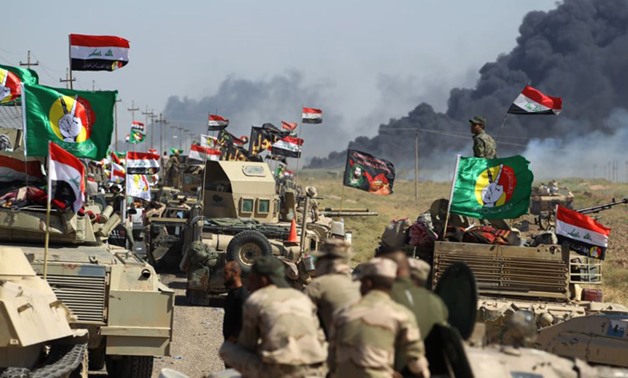
Iraqi troops and Iranian-backed Shiite militia forces gather in the outskirts of Hawija city in the southwest of Kirkuk. REUTERS
CAIRO – 15 October 2017: Anyone with a vague interest in Middle Eastern politics will have been aware of the Kurdish independence referendum, which took place on September 25; just two weeks ago.
In the face of extensive international pressure, Iraq’s Kurds opted to stand tall in a move which embodied the nationalistic pride of the Kurds across Iraq, as well as Iran, Turkey and Syria.
Unsurprisingly, Iraq’s Kurds voted in favor of independence with a convincing 93 percent ‘yes’ vote. Unsurprisingly again, the two-week period following the vote saw a threatening back and forth discourse as Baghdad, Iran and Turkey attempted to force the Kurds to revoke the referendum result.
The previous days have seen these tensions reach a boiling point. As Kurdish pride and determination grow ever more resilient, Turkish and Iranian pressure has forced Baghdad’s hand. Reports from inside Iraq from Thursday night identified a massive culmination of Iraqi and Iraqi-allied troops on the edge of Kirkuk, the valuable oil-rich region which is heavily disputed by both Erbil and Baghdad.
I say “Iraqi and Iraqi-allied” forces, but reports have shown the extensive presence of Popular Mobilization Forces (PMF). Iraqi Prime Minister Haidar al-Abadi said he was "not going ... to make war on our Kurdish citizens," yet once again Iranian pressure presided in Iraq and thousands of heavily armed Khamenei-allied Shi’ite militias have massed around Kirkuk.
For argument’s sake I will call them the “Iranian-backed” movements in Kirkuk, as in reality Iran is the foremost agent behind the mobilization of troops in Iraq.
The U.S. government has strongly opposed the Kurdish referendum during the buildup to the vote, hailing the unity of Iraq as a greater source of peace and stability than the creation of an independent Kurdish state in the north.
 Kurdish peshmerga fighters hold a position on a river bank across from Iraqi forces on the southern outskirts of Kirkuk city on October 14. AFP
Kurdish peshmerga fighters hold a position on a river bank across from Iraqi forces on the southern outskirts of Kirkuk city on October 14. AFP
The mobilization of Iranian-backed militias in Kirkuk put the U.S. in a very difficult position. While the U.S. has continually opposed Kurdish calls for independence, the involvement of Iranian-backed militias complicate the longevity of this policy for three fundamental reasons:
1. The Kurds in Iraq and Syria are significant allies of the United States. The Peshmerga in 2003 were fundamental in ousting Saddam Hussein from Iraq and helping maintain control in the country. The Peshmerga have also been crucial in the battle against the Islamic State, helping to rescue thousands of Yazidi’s as well as helping maintain state-security in the face of the total collapse of the Islamic State (IS). In Syria, the Kurdish YPG has aced as the foremost ally of the U.S., and has helped recapture significant territory from IS. Consequently, the reputation of the U.S. in supporting its allies is now at stake.
2. Donald Trump proclaimed on Saturday that the U.S. would withdraw from the groundbreaking 2015 Iran nuclear deal, as well as formally adding Iran’s Islamic Revolutionary Guards Corps to the U.S. antiterrorism sanctions list. Trump’s motives are clear; he wants to implement any strategy possible, regardless of the global shockwaves it might produce, in order to combat Iranian influence.
3. The Iraqi army is a major recipient of U.S. military aid and funding. Billions of dollars worth of weaponry have flowed into the country in previous years in order to bolster the military forces. Furthermore, the previous days have shown Iran-allied militia flags flying over U.S provided humvees.
Where does the U.S. turn now? Trump is adamantly against Iranian aspirations for regional power; however they are indirectly providing military hardware in an anticipated battle against the U.S’s biggest ally in Syria and Iraq.
Has Washington’s firm stance against Kurdish independence emboldened Iraq? I would say yes. The mobilization of a U.S.-funded Iraqi army and their allied PMF has put the U.S. in a difficult position where they are forced to decide whether to designate the PMF as a threat or not; at a time of a stark shift in U.S. policy towards rolling back the influence of Iran. In addition, the U.S. may have to re-think its policy towards the Iraqi Prime Minister and Commander-in-Chief, Abadi.
Now is the time Trump needs to stand strong and support the Kurds who have been shining a light in the darkness of Iraq and Syria for the previous few years, and who have also been a reliable ally to the West. This is not to say military intervention is needed; far from it. Diplomacy can swing Iraq’s hand, and an immediate plan to negotiate the future of Iraqi Kurdistan, and more immediately the future of Kirkuk and its resources, is essential to avoid conflict.
Twitter:


Comments
Leave a Comment